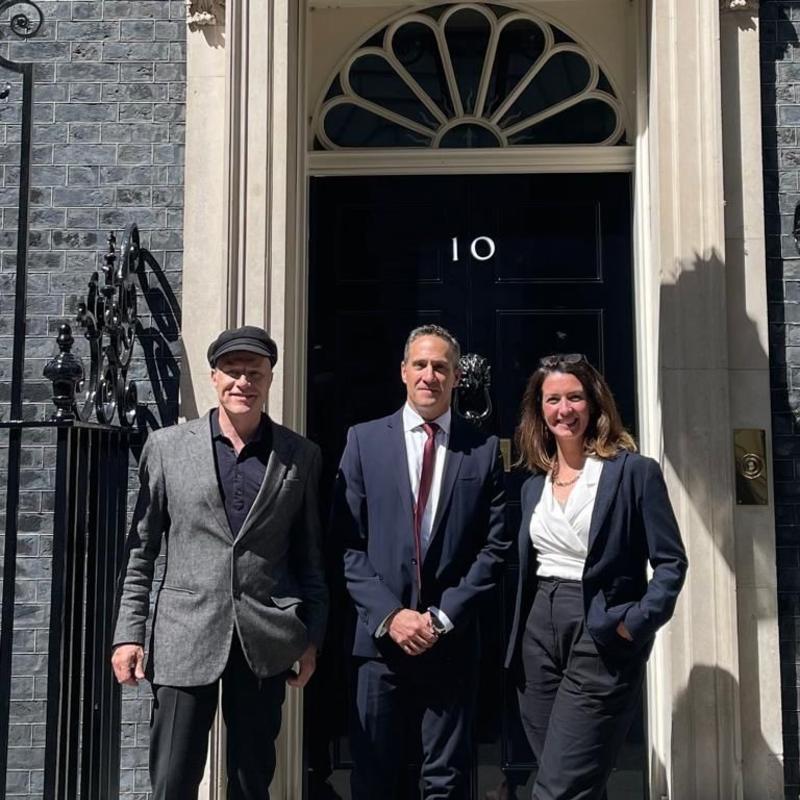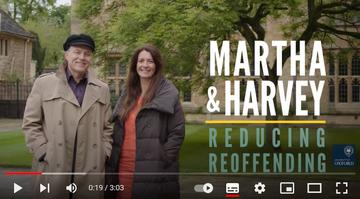The Changing Lives Lab
The Changing Lives Lab
The Changing Lives Lab Group conducts research with the most vulnerable and stigmatised groups, seeking to bring methodological rigour where it is most needed. Our primary goal is to improve the lives of excluded and marginalised groups, such as people who have been to prison. To date, we have found that behaviour in prison significantly improves for people enrolled on football-based interventions, compared to a matched control group. This research is carried out in association with The Twinning Project: “a partnership between HM Prison and Probation Service (HMPPS) and professional football clubs with the objective of twinning every prison in England and Wales with a local professional football club”.
The Twinning Project is uniquely placed to help Oxford's Centre for the Study of Social Cohesion (CSSC) to investigate whether football-based interventions may help re-build the void in social support experienced by many formerly incarcerated people, leading to a reduction in re-offending. With longitudinal survey, interview, and database analyses, the CSSC aims to address how one of the most powerful social identities in the UK - football - can effect meaningful, lasting changes to some of our most vulnerable and disenfranchised citizens.
Privacy Notice: Use of Reoffending Data for the Twinning Project Research Study

We have been invited to Number 10 Downing Street to share our findings with an advisor to the Prime Minister and our sports research has been used in UN policy documents.

We have contributed to efforts to raise the profile of the Twinning Project with the support of football ‘royalty’: (L-R) Arsène Wenger OBE, Dr Martha Newson, Prof Harvey Whitehouse, David Dein OBE.
Key Questions
Learn more about our approaches to the key questions guiding this research.
Funded by a Future Leaders Fellowship from UK Research & Innovation and an Advanced Grant from the European Research Council, the Changing Lives Lab Group works closely with key stakeholders to analyse a pioneering prison intervention to reduce reoffending rates. With unique access to His Majesty’s Prison and Probation Service data, our team has been investigating how the Twinning Project, an international charity pairing football clubs with their local prison to deliver FA-accredited qualifications, can tackle reoffending. Our results show that the impact of high-profile, coach-led programmes starts inside prison – with adjudications (court hearings for offences committed while in prison) significantly reducing compared to a control group, and wellbeing improving for those who started the programme not feeling their best. Supporting decades of theory and experimental work, we found that social bonding lay at the heart of these improvements. Over the next four years, we will analyse reoffending data shared by the Ministry of Justice to track the individuals we worked with in prison over time, analysing not just convictions but subtle indices of societal gain, such as levels of homelessness, taxes paid, and hospitalisations. Our approach not only explains whether such programmes work, but precisely how social bonding and transformative experiences affect those most in need of positive change.
Coupled with the potential for criminal behaviour from former prisoners, reintegration challenges include assisting formerly incarcerated people to find suitable housing and employment opportunities – particularly for formerly incarcerated people with intersectional identities, e.g., in many countries ethnic minorities may face particularly harrowing obstacles to securing a job. Our lab group is now investigating what paths to bonding best encourage the general public to welcome the formerly incarcerated back into the community, by providing a platform through which employers are able to bond with ex-prisoners: shared experiences or, at least, a perception of having gone through tough times together. Sport may be the ideal platform to capture this reciprocal dynamic. Building on work supported by an Advanced ERC grant and an ESRC PhD scholarship at St Cross College demonstrating the profound and lasting bonds fused football fans around the world, we are working to better understand how sports identities can be leveraged to help support the most marginalised in our communities.
Events
Outputs
- Peitz, L., Lobban, R., Ruler, M., Newson, M. (2025) Scoring Second Chances: Addressing Women's Unique Challenges and Opportunities in a Football-Based Prison Programme Journal of Community & Applied Social Psycholog, Volume 35, Issue 1
- Newson, M., Cunliffe, J., Whitehouse, H. (2025) Fusing concept to theory: identity fusion's potential role in crime research Theory and Society
-
Newson, M., Peitz, L., Cunliffe, J., & Whitehouse, H.. (2025) A soccer-based intervention improves incarcerated individuals’ behaviour and public acceptance through group bonding. Nature Human Behaviour, 8, 2304–2313.
-
Peitz, L., R. Lobban, M. Ruler, & Newson, M. (2025) Scoring Second Chances: Addressing Women’s Unique Challenges and Opportunities in a Football-Based Prison Programme, Journal of Community & Applied Social Psychology, 35(1).
-
Newson, M., L. Peitz, J. Cunliffe, & Whitehouse, H. (2025) Sports-Based Interventions Fostering Positive Identity Formation in Prison: Insights From the Twinning Project, Journal of Community & Applied Social Psychology, 35(4).
-
Newson, M., Cunliffe, J. & Whitehouse, H. (2025). Fusing concept to theory: identity fusion’s potential role in crime research. Theory and Society.
-
Peitz, L., Whitehouse, H., & Newson, M. (2025). Can transformative experiences bridge the gap between receiving communities and formerly incarcerated persons? British Journal of Social Psychology, 64.
-
Misiak, M., Kavanagh, C., Muzzulini, B., & Whitehouse, H. (2025). Bonding through adversity: Effects of Brexit and COVID-19 lockdown on identity fusion and pro-group behavior. Political Psychology.
-
Newson, M., L. Peitz, J. Cunliffe, & Whitehouse, H. (2025) Sports-Based Interventions Fostering Positive Identity Formation in Prison: Insights From the Twinning Project, Journal of Community & Applied Social Psychology.
- Newson, M., Peitz, L., Wibisono, S., White, F., Whitehouse, H. (2024) Anti-social behavior and soccer identities: different continents, same mindset? Self and Identity, Volume 23, Issue 7-8
- Peitz, L., Newson, M. (2024) Sport-based interventions and health in prisons: The impact of Twinning Project on prisoner wellbeing and attitudes Sage Journals
- Newson, M., Peitz, L., Wibisono, Knijnik, J., White, F. & Whitehouse, H. (2024) Anti-social behavior and soccer identities: different continents, same mindset?, Self and Identity, 1–18.
-
Newson, M., Peitz, L., Cunliffe, J. & Whitehouse, H. (2024) A soccer-based intervention improves incarcerated individuals’ behaviour and public acceptance through group bonding, Nature Human Behaviour.
-
Research Briefing (2024) Social bonds and community support are vital to prison reform. Nature Human Behaviour.
-
Peitz, L. and Newson, M. (2024) Sport-based interventions and health in prisons: The impact of Twinning Project on prisoner wellbeing and attitudes, Journal of Health Psychology.
-
Newson, M., Haslam, S.A., Haslam, C. et al. (2024) Social identity processes as a vehicle for therapeutic success in psychedelic treatment. Nature Mental Health, 2: 1010–1017.
-
Newson, M., White, F., Whitehouse, H. (2023) Does loving a group mean hating its rivals? Exploring the relationship between ingroup cohesion and outgroup hostility among soccer fans International Journal of Sport and Exercise Psychology, Volume 21 (4): 706-724
Newson, M., Peitz, L., Gitsham, H., Imada, H., Abrams, D. (2023) 'We need community': Bridging the path to desistance from crime with community football Journal of Community & Applied Social Psychology, Volume 34, Issue 1
Newson, M., L. Peitz, H. Gitsham, H. Imada, & Abrams, D. (2023) ‘We need community’: Bridging the path to desistance from crime with community football, Journal of Community & Applied Social Psychology, 34(1).
-
Newson, M., Whitehouse, H. (2020) The Twinning Project: How football, the beautiful game, can be used to reduce reoffending, Prison Service Journal, 246
-
Whitehouse, H., Fitzgerald, R. (2020) Fusion and Reform: The Potential for Identity Fusion to Reduce Recidivism and Improve Reintegration, Anthropology in Action, 27(1): 1-13
-
Newson, M. et al. (2018) Brazil's football warriors: Social bonding and inter-group violence, Evolution and Human Behavior, 39(6): 675-683
-
Newson, M., Buhrmester, M., Whitehouse, H. (2016) Explaining lifelong loyalty: The role of identity fusion and self-shaping group events, PloS one, 11(8): e0160427
-
Newson, M. (2024) Football can improve wellbeing of people in prison – and could help stop reoffending, The Conversation
-
Newson, M. (2021) Why do hardcore football fans behave like rutting stags?, Psyche -
Newson, M. (2021) When football clubs are less successful, fans are more loyal to each other, The Conversation
-
Football-based social intervention found to improve chances of rehabilitation for prisoners
University of Oxford
15 October 2024 -
Louts – and cocaine – are ruining the sports-watching experience
The Telegraph
8 April 2024 -
Forget the stereotypical hooligan! Passionate football fans are more likely to show KINDNESS towards rival team supporters, study finds
Daily Mail
13 September 2022 -
Passionate football fans ‘likely to be hostile to rival fans but also more kind’
Independent
13 September 2022 -
The rise of disorder at football: why is it happening and what can be done?
The Guardian
18 February 2022 -
Habitual cocaine use by football fans is a problem the sport needs to face
The Telegraph
3 December 2021 -
Devoted football fans experience 'dangerous' levels of stress
BBC News
20 January 2020 -
How understanding football violence could help the fight against terrorism
International Business Times
29 September 2017
Social bonds improve behaviour and wellbeing in prison: Twinning Project results
Researcher Stories: Reducing reoffending | University of Oxford
Martha Newson | Why We Hate, Sport fan bonding & violence | Discovery
Martha Newson at 04:30 | Why the Far Right Tries to Recruit Football Hooligans | Vice
Martha Newson at 48:15 | The Great Debate: Is racism in sport here to stay? | Sky News
Martha Newson | Football and Racism | BBC Radio 4 The World Tonight
Martha Newson | Why do we care so much about games? | BBC News World Service
Martha Newson | How Sports Became Us | Freakonomics Radio
Why Do We Do That? | More.. Football fanatics with Martha Newson | BBC Radio 4
Featured content

Soccer-based intervention improves inmate behaviour and public acceptance










